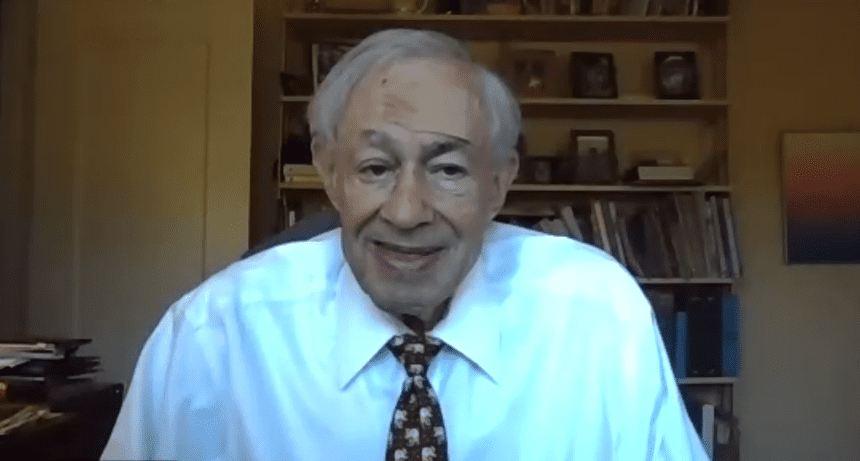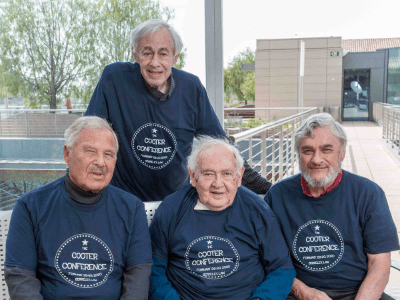
By Gwyneth K. Shaw
Over nearly half a century on the Berkeley Law faculty, Professor Stephen Sugarman has left his indelible mark in many ways — from court fights over state school funding to compiling and maintaining an essential guide to the East Bay’s best eateries. His sterling scholarly reputation is matched only by the fervent admiration from his students.
This spring, the California Law Review published a special “festschrift” issue to commemorate Sugarman’s brilliant career, which spans five decades and includes more than a dozen books and countless articles. On April 29, colleagues, family, friends, and students gathered virtually for a salute.
Professor Daniel Farber kicked off the event by noting that in a highly unusual situation, Sugarman never even applied to join the Berkeley Law faculty. Instead, his appointment came after a co-author, Professor Emeritus John Coons, arrived in 1968.
“While he was out here to confer with Jack he was unexpectedly approached by the dean, who offered him a job,” Farber said. “We should all be so lucky — and we should all be so lucky to make the kinds of contributions that Steve has made to legal scholarship to students and to public policy.”
Sugarman came to Berkeley in 1972, just after he and Coons helped litigate the original Serrano v. Priest school financing case. Funding parity for schools has remained a pillar of Sugarman’s scholarship throughout the decades of debate that have followed.

Dean Erwin Chemerinsky, who recalled reading Coons and Sugarman’s 1970 book Private Wealth in Public Education as a college student, called Sugarman “the institutional memory and the conscience of Berkeley Law.”
“I think it’s fair to say no one is more influential in the field of education law over the last half century than Steve Sugarman, and he is truly a wonderful colleague,” Chemerinsky said. “Steve, no words can express thanks for all you’ve done for Berkeley Law, and continue to do. Let me just say thank you.”
Professor Christoper Edley Jr., himself a longtime dean of the school, also lauded Sugarman’s public service in the realm of education. He said he knew of Sugarman’s work “before I knew how to spell Berkeley” and that his advocacy for and writings on school funding have “saved many billions of dollars in social costs and literally millions of lives.”
“Steve, I’ve certainly tried to be a great American, but not on your scale,” said Edley, who came to the school in 2004 and has long combined government service with academia. “Instead of wasting 23 years teaching at Harvard, I should have been here at Berkeley being mentored by you.”
A career of breadth and depth
Other collaborators and former colleagues spoke of Sugarman’s impact stemming from his work in torts, including health law and insurance and personal injury policy.
Stanford Law Professor Robert Rabin’s contribution to the California Law Review festschrift volume recounted Sugarman’s scholarship on torts. He recalled how from the mid-1980s on, Sugarman advocated for abandoning the traditional legal framework of torts and replacing it with a social welfare scheme that would compensate victims fairly, regardless of the source of their injury.
“Steve has immeasurably enriched every dimension of intellectual- and policy-based approaches to injury law,” said Rabin, who co-authored frequently with Sugarman on a number of topics, including tobacco liability cases. “For that and our personal friendship — which, by the way, goes all the way back to our student days at Northwestern — I have been the fortunate beneficiary.”
Raja Krishna ’21 described being in a potential jury pool in his 2L year and getting asked about the current state of tort law when the plaintiff’s attorney found out he was a law student.
“I took the chance to reflect on some of Professor Sugarman’s ideas about no-fault insurance, strict product liability, and intentional torts,” Krishna said. “Needless to say, I was promptly dismissed from the jury pool — but not without a lengthy comment from the judge praising Professor Sugarman’s scholarship and the wide-ranging influence of his ideas.”
Within the school, Sugarman is known as a true community builder: Generous with colleagues and students and dedicated to the school’s mission. He served two stints as associate dean and has been a tireless participant in committee and other work, Chemerinsky said.
Yale Law Professor Peter Schuck called Sugarman “one of those people that no great institution can do without.”
Finding music in torts
Krishna and other current students added their praise to the conversation, describing Sugarman as a brilliant teacher and mentor as well as someone who’s just fun to talk to.
California Law Review Editor-in-chief Samson Lim ’21 recounted that when the idea of publishing a festschrift volume for Sugarman first came up, the journal’s board endorsed it unanimously. Lim said he felt a particular connection to Sugarman, since he first encountered his work while completing his master’s degree in education policy. That work helped push Lim to apply to Berkeley Law.
Krishna, a member of Sugarman’s small group of students during his first year, said the group affectionately referred to themselves as “Sugarmod.” Some wrote a series of funny songs about torts, only to discover Sugarman was working on a whole musical about the topic with his granddaughter.
“Every now and then he approached us after class and would give us notes or ask for an update on the songwriting process,” Krishna said. “Going through the creative process with Professor Sugarman is one of my favorite memories from law school. It makes me smile to this day.”
A lasting legacy

Hayley MacMillen ’21 also took Torts with Sugarman as a 1L and recalled struggling at first. But when things began to click, she approached him with an idea about medical malpractice that he found interesting.
Before she knew it, he was calling her back into his office and told her he’d been discussing her idea with Chemerinsky and both were excited about it.
“I haven’t told him this before, but that moment was pivotal for me — this leading scholar took me seriously,” MacMillen said. “That was really the moment when I started thinking, ‘Maybe I do belong here, both in this Torts class and in the law.’”
She became Sugarman’s research assistant as a 2L, and said he’s become not just a mentor but a true friend.
“He takes joy, not only in the law, but in Berkeley Law, from the Halloween parties and the potluck dinners he throws for his small mod to the half a century he’s spent strengthening the school. He also takes joy and his work outside the school on issues, as we’ve heard, from public health to access to education,” MacMillen said. “He takes joy in life beyond work, from his famous reviews of local restaurants to his loyalty to the Oakland A’s.
“He’s really shown me what it looks like to love what you do, to fight for what you believe in, and to have a sense of humor.”
At the end of the event, an obviously touched Sugarman offered his own salutes to his colleagues — and his wife of “50 splendid years,” Karen Carlson.
“We law professors at Berkeley Law have the best job I can think of,” he said. “It’s beyond what I could have imagined when I came here.”
And no, he said, he’s not retiring yet.
“I think there is one theme that runs through a great deal of my work, and it’s that we as a society can do a lot more to improve the lives of the have-nots in our nation, both by enhancing their material well-being and also by empowering them to have considerably more control over their lives,” he said. “These are things upon which I have been working and hope to be able to continue to work as I finish up my career at Berkeley.”